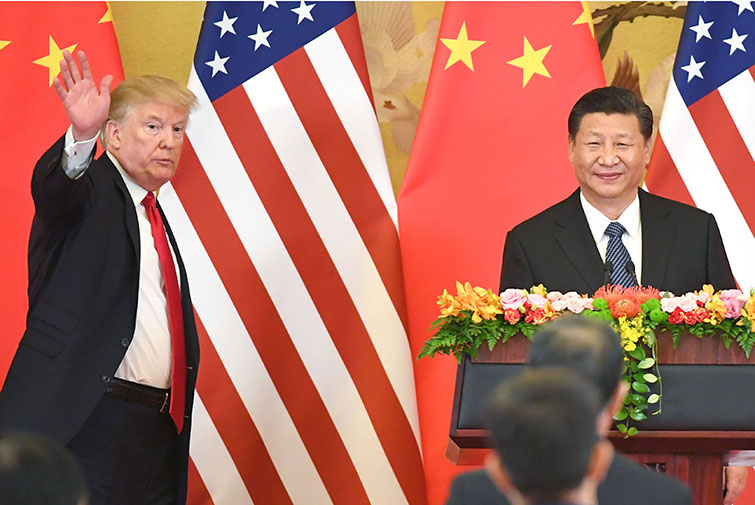
This article is taken from our FREE daily investment email Money Morning.
Every day, MoneyWeek’s executive editor John Stepek and guest contributors explain how current economic and political developments are affecting the markets and your wealth, and give you pointers on how you can profit.
Britain’s resounding election result, in favour of clearing the Brexit uncertainty and avoiding a socialist realignment of the economy, has sent UK markets soaring.
We’ll have a lot more on the specific investment implications of the UK’s general election in this week’s issue of MoneyWeek magazine, out on Friday. If you’re not already a subscriber, then get your first 12 issues for £12 here.
But it’s not just the UK.
The US also hit record highs at the end of last week, while the eurozone is heading higher too.
There’s an element of relief that one of the world’s biggest financial centres (London) is still in business, sure.
But a bigger component is probably the fact that China and the US appear to have reached some sort of trade deal.
Oddly enough, this all points to what may be the biggest long-term threat to the current bull market – what if everything goes right?
The US and China now have a tentative trade deal
Markets have been vaguely fretting about the state of the relationship between the US and China for several years now. It’s not done a lot to hold markets back, in all honesty, but it is a constant niggle at the back of investors’ minds.
Similarly, in the UK specifically, people have got on with their lives as Brexit uncertainty has hung over our heads. But it’s always been there. It’s not exactly conducive to exuberant animal spirits.
And yet, not only has the Brexit outlook suddenly become a lot clearer, but the US and China appear to be coming to terms too.
We have a ‘phase one’ deal. It “still has some hoops to pass through”, as Arthur Kroeber notes on Gavekal. But it’s likely to happen. So what does it do?
New tariffs that were due to kick in on yesterday are being indefinitely deferred. Tariffs imposed on China by the US at the start of September, will be halved, to 7.5%. The earlier tariffs all stay in place.
China says it will more than double imports from the US by 2021. Kroeber suggests this is hard to meet “in the real world”. Chinese imports from the US hit $130bn in 2017. The idea that it will be able to boost this by $200bn by 2021 seems unrealistic given that the “biggest previous two-year jump” came in at less than $40bn.
Thirdly, China has made small moves towards being more respectful of intellectual property rights.
As this list suggests, it’s not that radical a deal. Also, like it or not, China and the US are firmly in competition and that will continue. The technology war in particular, will prove to be a long-term sticking point.
However, the two sides have moved closer. And for now at least, any deal is better than no deal. As John Authers points out on Bloomberg, the US dollar weakened and the Chinese yuan strengthened on the deal. Those moves point to markets cheering the outcome.
Markets aren’t positioned for a happy ending
Why does any of this matter? Or rather, why is it anything to be concerned about?
I’m more than happy for the good times to roll. But you have to remember that markets are currently largely positioned for the opposite. They are positioned for a world in which interest rates never rise again. They are positioned for the “new normal”. They are positioned for “secular stagnation”.
This is why money has flooded into ridiculous blue-sky nonsense pitched by charismatic salespeople – like WeWork, for example – while companies that make money in the here and now are mostly priced as though a recession is coming any second.
The thing is this: what if the manufacturing cycle really does turn up, and China gets back on its feet? What if companies both in the UK and in the EU decide that they can get on with life now that a Brexit pathway is clearer? What if the US and China decide to rub along a little more closely?
None of those things are deflationary or recessionary or even stagnation-ary. If global demand is greater than expected then that points to higher oil prices for a start. It also points to even more pressure on labour markets – whatever spare capacity we’ve still got will surely be deployed sharpish.
I’m not saying that we’re definitely heading for a boom. But the chances of one happening are a lot higher than markets are currently pricing in.
So what happens if it all goes right? It’ll mean big changes for markets, that’s for sure. Those who are betting that inflation is dead in the water, or who haven’t seen a developed nation with interest rates above 3% in their entire adult lifetime, might get quite a nasty shock.
In all, I suspect that 2020 is going to be a year full of surprises, threats you’ll have to avoid, and opportunities that you won’t want to miss. So remember – if you’re not already a subscriber, you can pick up get your first 12 issues for £12 here.